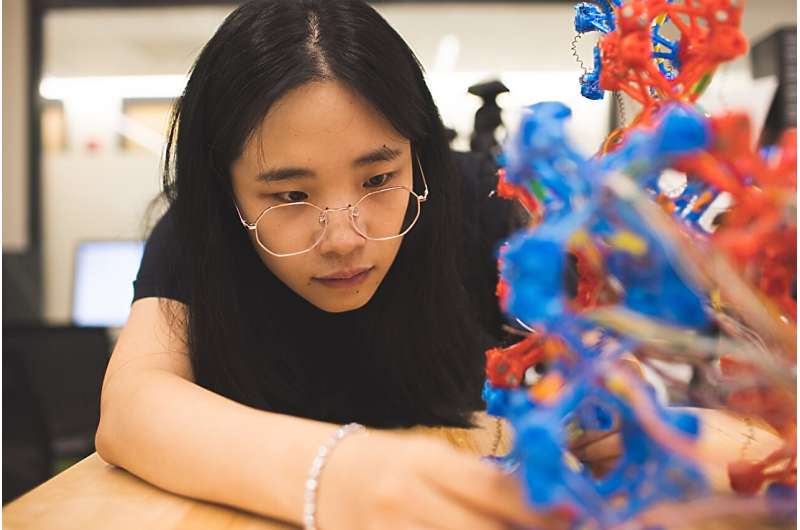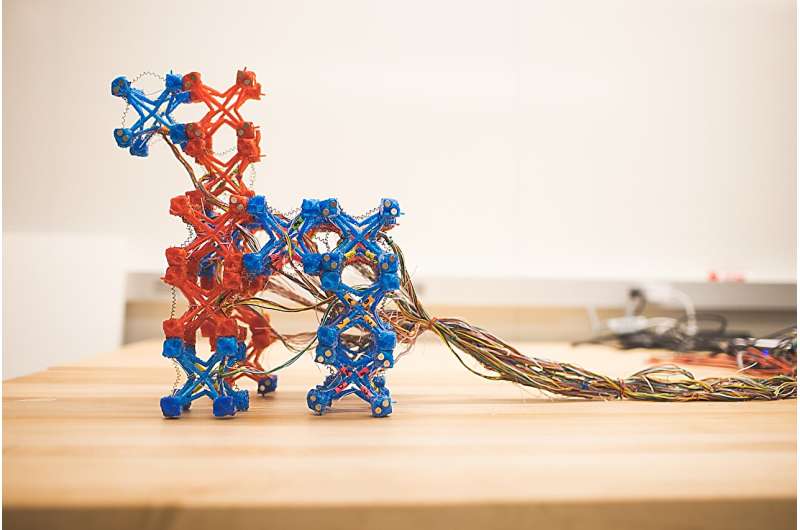
Dartmouth researchers are crafting soft robotic blocks that can work in unison to create structures able to bear weight, roll, walk, grip objects and transport loads.
Depending on the task at hand, the blocks can assume the shape most suited to carry it out. For example, such robots could potentially be useful in rapid response during emergencies—large-scale versions dropped by drones or helicopters could assemble into protective, makeshift tents for rescue.
“There are ants that cooperatively form bridges across gaps on their trail or assemble into watertight rafts in times of need. We set out to design robotic blocks that, like the ants, can join up in different ways to perform different functions,” says Luyang Zhao, a computer science Ph.D. candidate at the Guarini School of Graduate and Advanced Studies who became interested in robotics as an undergraduate.
StarBlocks, a tabletop prototype created by Zhao and her collaborators from the Dartmouth Reality and Robotics Lab, Rutgers University, and Yale University, demonstrates the idea and its potential to be a dynamic toolbox.
Each block, or module, has a star-shaped skeleton. Made by 3D printing from a material that combines the properties of plastic and rubber, the module’s core is light yet stretchy.

Mechanical muscles—springs made of alloys that deform when heated electrically—reshape the skeleton, enabling the block to mimic movement, bend, and change size. The modules attach to each other by means of magnets affixed at the corners.
In a paper published in IEEE Robotics and Automation Letters, the researchers showcase a variety of structures that the modules can make: load-bearing architecture in the form of a dome-shaped tent, a rolling wheel, a dog-inspired quadruped to explore different gaits, a robotic arm that can grab and relocate small objects, and a linear chain that uses a wave-like motion to transport a ball along its length.
The researchers also demonstrate self-assembly of the blocks along a surface. With position information monitored by a camera, a computer can activate individual blocks, causing them to move towards others and connect.
“This is a first-of-its-kind modular system that you can reconfigure, and once it is reconfigured, use its flexibility to achieve tasks,” says co-author Devin Balkcom, professor of computer science. “Those tasks include both locomotion and manipulation; that’s also very unusual.”
The robots combine the advantages of different types of systems, Balkcom says. The modularity makes the systems versatile and easy to repair, and the modules combine the flexibility of soft robots with the structural capabilities of rigid blocks.
More information:
Luyang Zhao et al, StarBlocks: Soft Actuated Self-Connecting Blocks for Building Deformable Lattice Structures, IEEE Robotics and Automation Letters (2023). DOI: 10.1109/LRA.2023.3284361
Citation:
Computer science researcher creates flexible robots from soft modules (2023, August 15)
retrieved 16 August 2023
from https://techxplore.com/news/2023-08-science-flexible-robots-soft-modules.html
This document is subject to copyright. Apart from any fair dealing for the purpose of private study or research, no
part may be reproduced without the written permission. The content is provided for information purposes only.
Stay connected with us on social media platform for instant update click here to join our Twitter, & Facebook
We are now on Telegram. Click here to join our channel (@TechiUpdate) and stay updated with the latest Technology headlines.
For all the latest Technology News Click Here
For the latest news and updates, follow us on Google News.
